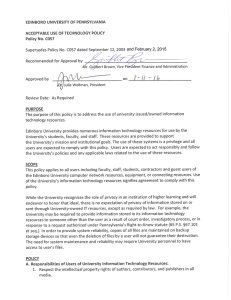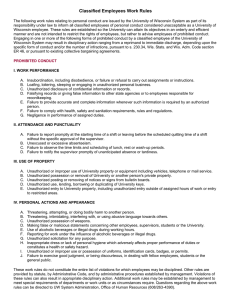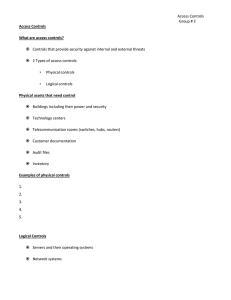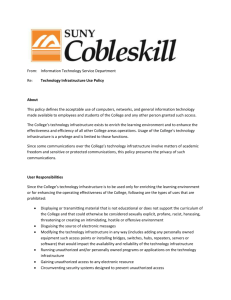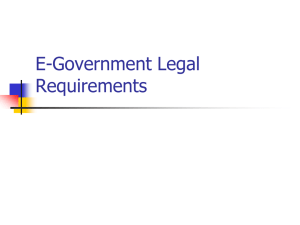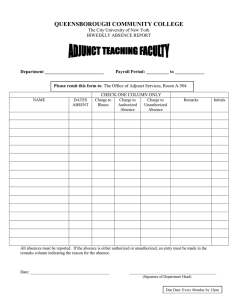UNIVERSITY OF WISCONSIN SYSTEM UNIVERSITY STAFF WORK RULES
advertisement
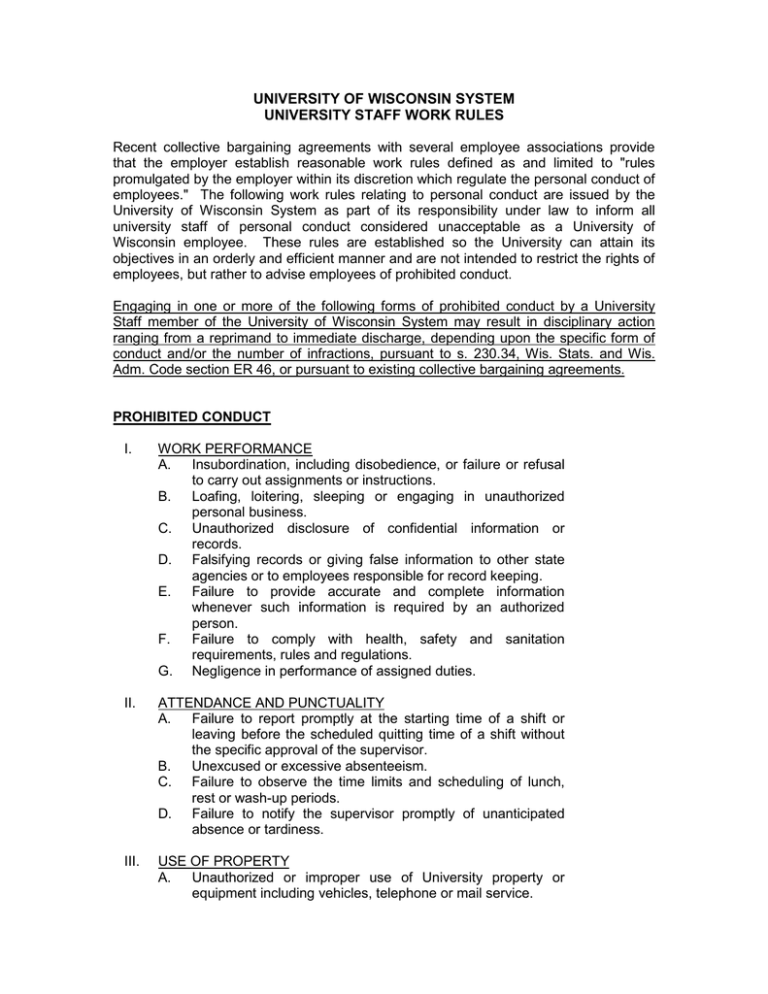
UNIVERSITY OF WISCONSIN SYSTEM UNIVERSITY STAFF WORK RULES Recent collective bargaining agreements with several employee associations provide that the employer establish reasonable work rules defined as and limited to "rules promulgated by the employer within its discretion which regulate the personal conduct of employees." The following work rules relating to personal conduct are issued by the University of Wisconsin System as part of its responsibility under law to inform all university staff of personal conduct considered unacceptable as a University of Wisconsin employee. These rules are established so the University can attain its objectives in an orderly and efficient manner and are not intended to restrict the rights of employees, but rather to advise employees of prohibited conduct. Engaging in one or more of the following forms of prohibited conduct by a University Staff member of the University of Wisconsin System may result in disciplinary action ranging from a reprimand to immediate discharge, depending upon the specific form of conduct and/or the number of infractions, pursuant to s. 230.34, Wis. Stats. and Wis. Adm. Code section ER 46, or pursuant to existing collective bargaining agreements. PROHIBITED CONDUCT I. WORK PERFORMANCE A. Insubordination, including disobedience, or failure or refusal to carry out assignments or instructions. B. Loafing, loitering, sleeping or engaging in unauthorized personal business. C. Unauthorized disclosure of confidential information or records. D. Falsifying records or giving false information to other state agencies or to employees responsible for record keeping. E. Failure to provide accurate and complete information whenever such information is required by an authorized person. F. Failure to comply with health, safety and sanitation requirements, rules and regulations. G. Negligence in performance of assigned duties. II. ATTENDANCE AND PUNCTUALITY A. Failure to report promptly at the starting time of a shift or leaving before the scheduled quitting time of a shift without the specific approval of the supervisor. B. Unexcused or excessive absenteeism. C. Failure to observe the time limits and scheduling of lunch, rest or wash-up periods. D. Failure to notify the supervisor promptly of unanticipated absence or tardiness. III. USE OF PROPERTY A. Unauthorized or improper use of University property or equipment including vehicles, telephone or mail service. B. C. D. E. IV. Unauthorized possession or removal of University or another person's private property. Unauthorized posting or removing of notices or signs from bulletin boards. Unauthorized use, lending, borrowing or duplicating of University keys. Unauthorized entry to University property, including unauthorized entry outside of assigned hours of work or entry to restricted areas. PERSONAL ACTIONS AND APPEARANCE A. Threatening, attempting, or doing bodily harm to another person. B. Threatening, intimidating, interfering with, or using abusive language towards others. C. Unauthorized possession of weapons. D. Making false or malicious statements concerning other employees, supervisors, students or the University. E. Use of alcoholic beverages or illegal drugs during working hours. F. Reporting for work under the influence of alcoholic beverages or illegal drugs. G. Unauthorized solicitation for any purpose. H. Inappropriate dress or lack of personal hygiene, which adversely affects proper performance of duties or constitutes a health or safety hazard. I. Unauthorized or improper use or possession of uniforms, identification cards, badges, or permits. J. Failure to exercise good judgment, or being discourteous, in dealing with fellow employees, students or the general public. These work rules do not constitute the entire list of violations for which employees may be disciplined. Other rules are provided by statute, by Administrative Code, and by administrative procedures established by management. Violations of these rules can also result in appropriate disciplinary action. Additional work rules may be established by management to meet special requirements of departments or work units or as circumstances require.
